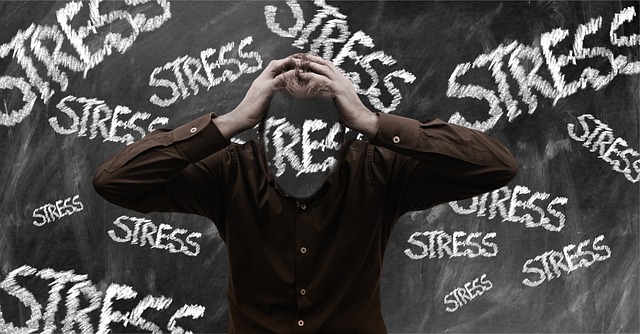Emotional regulation is key to managing stress, boosting mental well-being and quality of life. By identifying triggers, practicing mindfulness, deep breathing, cognitive reframing, and engaging in physical activity, individuals can develop effective coping strategies for immediate relief. Long-term resilience building through therapies like CBT and MBSR strengthens emotional awareness, challenging negative thought patterns to reduce stress event impacts. Professional help via CBT, MBSR, or EMDR offers personalized tools for managing stressors, enhancing coping abilities, and promoting overall well-being.
Emotional regulation is a powerful tool in managing daily stress. In this comprehensive guide, we explore effective strategies to gain control over your emotions and reduce stress levels. From understanding the fundamentals of emotional regulation to identifying personal triggers, we provide actionable steps. Discover instant stress-relieving techniques, learn to build resilience, and delve into mindfulness practices. Additionally, we discuss when and how to seek professional therapy for personalized stress management. Equip yourself with these tools for a calmer, more balanced life.
Understanding Emotional Regulation and Its Role in Stress Control

Emotional regulation is the process by which individuals manage and control their emotional responses, particularly in stressful situations. It’s a crucial component of mental well-being, playing a pivotal role in stress control. By understanding and mastering emotional regulation techniques, one can significantly reduce the adverse effects of stress on both physical and psychological health. This involves recognizing and accepting emotions, then responding to them in healthy and constructive ways instead of reacting impulsively.
Stress relief therapy often incorporates various strategies like mindfulness, deep breathing exercises, cognitive reframing, and emotional awareness training. These tools empower individuals to navigate challenging circumstances with composure, minimizing the impact of stressful triggers. Effective emotional regulation fosters resilience, enhances coping mechanisms, and promotes a sense of balance, ultimately leading to better stress management and improved quality of life.
Identifying Triggers: Recognizing Stressors in Your Life

Identifying triggers is a crucial step in managing stress and achieving stress relief therapy. It involves becoming attuned to the cues or situations that set off your stress response, often unconsciously. These triggers can be as simple as certain times of day, specific environments, or even interactions with particular people. By paying close attention to your emotional patterns and physical sensations, you can start to recognize these triggers and take proactive steps to mitigate their impact.
For instance, someone might discover that early mornings, when they need to rush through their routine, consistently leave them feeling frazzled. Or, perhaps a particular colleague’s criticism provokes feelings of anxiety. Once identified, these triggers allow individuals to develop strategies. This could include adjusting morning routines to create a calmer start or learning effective communication techniques to navigate critical conversations with colleagues, thus fostering better stress management and improved well-being.
Techniques for Instant Stress Relief: Quick Coping Strategies

In moments of intense stress, employing quick coping strategies can offer immediate relief and help regain control. One effective technique is deep breathing exercises. Taking a few slow, controlled breaths can activate your parasympathetic nervous system, promoting relaxation. Simple yet powerful, this method allows you to pause and gain perspective in stressful situations.
Another valuable strategy is engaging your senses. Practicing mindfulness by focusing on your surroundings—sights, sounds, and smells—can shift your attention away from stress-inducing thoughts. Additionally, physical activity releases endorphins, natural mood lifters. Even a short walk or simple stretching routine can significantly reduce stress levels and enhance overall well-being, providing an accessible form of stress relief therapy on-the-go.
Building Resilience: Long-term Emotional Regulation Skills

Building resilience is a key component of long-term emotional regulation and stress control. It involves developing coping mechanisms that enable individuals to bounce back from challenging situations, fostering a sense of robustness in the face of adversity. Through various stress relief therapies, such as cognitive behavioral therapy (CBT) or mindfulness practices, people can learn to identify and challenge negative thought patterns, replace them with healthier alternatives, and develop emotional awareness. This process strengthens their ability to manage intense emotions, reducing the impact of stressful events over time.
Resilience is not an inherent trait but rather a skill that can be cultivated. By consistently practicing these emotional regulation techniques, individuals build a mental fortress that protects them from the overwhelming effects of stress. This long-term approach allows for better coping strategies, improved decision-making under pressure, and enhanced overall well-being, ensuring a more balanced and serene life.
Mindfulness and Meditation: Calming the Mind and Body

Mindfulness and meditation are powerful tools in the arsenal of stress relief therapy. These practices encourage individuals to focus on the present moment, observing their thoughts and emotions without judgment. By cultivating awareness of both internal and external stimuli, one can disrupt automatic stress responses. This, in turn, promotes a sense of calm and enhances emotional regulation.
During meditation, individuals learn to acknowledge stressful thoughts as they arise, allowing them to let go of negative or repetitive patterns. Regular mindfulness exercises have been shown to reduce anxiety, improve focus, and boost overall well-being. Incorporating these practices into daily routines can help individuals develop a stronger connection with their minds and bodies, thereby better managing stress in various aspects of life.
Seeking Professional Help: Therapy Options for Effective Stress Management

When it comes to managing chronic or overwhelming stress, seeking professional help through therapy can be a game-changer. There are various therapeutic approaches tailored for effective stress relief, such as cognitive-behavioural therapy (CBT), mindfulness-based stress reduction (MBSR), and eye movement desensitization and reprocessing (EMDR). These therapies provide individuals with valuable tools to identify and change unhelpful thought patterns, enhance coping mechanisms, and develop healthier ways of managing stressful situations.
Therapy offers a safe and supportive space for exploring the underlying causes of stress and provides personalized strategies for long-term stress management. Through professional guidance, individuals can learn skills to improve emotional regulation, reduce anxiety, and cultivate resilience. With regular practice, these therapeutic techniques empower people to navigate life’s challenges with greater ease and confidence, ultimately leading to improved overall well-being.
